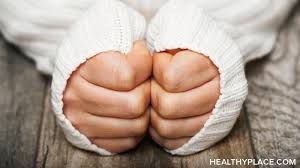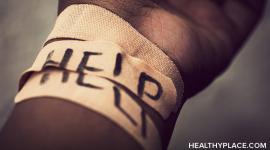As A Parent, How Do You Deal With A Child Who Self-Injures?

What should parents do after discovering their child is a self-injurer? Find out here.
It's very hard for a parent to deal with a child in pain. And it's even harder when a parent feels that he or she has exhausted the knowledge and resources available that might help solve a particular problem. When a child is cutting or engaging in any other form of self-injury, these feelings of pain and helplessness are multiplied.
When parents see the wounds on their teen's arms, they often react in fear, shock, and anger. They threaten. They beg. They want it to stop. According to Wendy Lader, Ph.D., founder of S.A.F.E. Alternatives, a residential program for self-injurers, "Two common reactions are either to become furious at the teen and to punish her, or to minimize the behavior as a phase or bid for attention and to ignore it."
But Licensed Counselor Leslie Vernick says a teen's really saying, Help, I'm hurting and I don't know how to deal with my pain!
"Endorphins released during cutting often soothe some deeper emotional pain—rejection, depression, self-hatred, or helplessness," Vernick explains. A teen who self-injures finds instant release through the biochemical reaction and correlates cutting with comfort.
Lader describes self-injury as "self-medication." Cutters haven't learned to express their emotions, so the feelings persist. "The teen uses physical pain to communicate something she's unable or unwilling to put into words," explains Vernick. "She needs help to process whatever emotional pain she feels so she'll learn healthy ways of dealing with hurts instead."
The first step for parents is to focus on your teen's deeper emotional needs. "If you discover your child's self-injuring, ask lots of questions. Is this a one-time thing? Is it a pattern? What did your child hope to accomplish by doing this?" Vernick advises. "Check other body parts. Arms and legs are favorite spots for cutting; if you spot old marks, don't hesitate to get professional help ASAP."
Lader also advises parents that "if you have a child who engages in self-injury, learning more about self-injury can help you understand why it occurs and help you develop a compassionate but firm approach."
You can also take positive action by consulting your pediatrician or family doctor, who can provide an initial evaluation or a referral to a mental health specialist.
Resource:
One book that might help you understand self-injurious behaviors is: When Your Child is Cutting. This book tells parents why self-injury happens, how to spot it when it is happening, and how to address this sensitive topic with confidence. It outlines a clear and simple plan for approaching a child who self-injures-because good communication is a necessary first step in healing. By helping them assess their situation and locate the best kinds of professional help, this book strives to support and reassure parents as they move through this difficult experience.
APA Reference
Staff, H.
(2008, December 14). As A Parent, How Do You Deal With A Child Who Self-Injures?, HealthyPlace. Retrieved
on 2025, April 24 from https://www.healthyplace.com/parenting/self-injury/how-do-you-deal-with-child-who-self-injures



